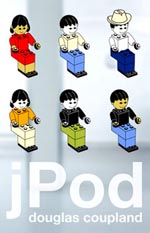Douglas Coupland - JPod
 Title JPod
Title JPod
Released 5th June 2006 (Special Edition Hardback & Paperback)
Publisher Bloomsbury
ISBN: 0747586772
You'll discover, quite early on in jPod, that Douglas Coupland is a asshole. A total prick from start to finish. He lies, he cheats, he steals, he blackmails, he quite possibly tresspasses in rural China, and just in case you didn't already hate him, you should know that he's also about to become obscenely rich.
I write, of course, not of Douglas Coupland, the author of jPod, but of Douglas Coupland, the character written into jPod that shares his name, occupation, mannerisms and some (but probably not all) of his personality. Confused? You won't be.
jPod, (the real) Coupland's latest novel, centres around a group of nerds whose surnames all begin with 'J' working at a games company, who find themselves in the same office ("pod") due to a computer error. The book follows the ins and outs of their daily lives, in the formless yet structured Coupland style - ostensibly, the book's about them writing a game for their employers (and their attempts to sabotage it with a murderous clown character) but that's merely the root from which the stories grow, into some glorious, diversion-filled tree.
If this is sounding familiar, it's probably because you read Microserfs, Coupland's 1995 novel about computer nerds, their office-lifestyle and their attempt to write a game. By his own admission, jPod is a spiritual sequel to Microserfs, "updated for the Google generation" if you'll permit me to echo the marketing hype.
Like Microserfs, between the blocks of prose you'll find Coupland's art-school background spoilling onto the page (canvas?) as language and words become abstractualised and reshaped into a mash-up of distilled concepts and aesthetics. The subconcious of your laptop, Coupland calls it. Then there are the fictional eBay sales pitches, random Kanji characters, and page upon page which simply list the digits of Pi, only one of the 0 (zero) characters in it has been swapped for a capital O - just some of the interludes you'll find dotted throughout the book, occasionally relating to the story, occasionally just for fun. And, make no mistake, they are fun.
The whole novel, in fact, reads as if Coupland has dispensed with the slightly more sombre character studies of his recent work and gone back to writing something just for the fun of it. The fantastical elements that have crept into his later novels are still there, though rather than a radioactive meteorite or a mythical AIDs cure, it's a ballroom dancing human trafficker and drug-dealing, philandering parents. Coupland's worlds don't strictly resemble our own, but you'll never get the sense that it's too ridiculous. Maybe that's more a reflection on me than the material.
As mentioned, Coupland has written a version of himself into the book in some kind of post-ironic metafictional collision - the characters discuss his work, openly mocking the way his characters are written, and he repeatedly shows up himself to change the direction of the story. He's clearly got a sense of humour about himself, and what might seem indulgent instead comes across as a spoof-ish self-aware jab that gets one in there before the critics can.
The most obvious criticism of the book is that when faced with his output over the last few years, you might find yourself thinking that it's all gone a bit easy-listening. There's a definite sense that the characters that usually populating his books have been replaced by one-dimensional pastiches of his own work, all simpsons references and quirky behaviour. It certainly seems like a deliberate choice, but some of the best parts of Coupland's previous stories are the small glimpses beneath the outer shell of the characters that give it all a wider context. In this case, even Ethan, the sole protaganist, whose head we inhabit for the entire book, never really reaches a level of complexity comparable to Coupland's previous leading men, feeling, as he does, about as swept away by the action as the readers.
Despite this seeming lack of complexity, which you may agree is fine if you know that's what you're getting, JPod is by no means a failure in any terms. It's certainly one of Coupland's funniest releases yet, and perhaps that's because it's his closest ever attempt at an outright comedy. A writer who, for better or worse, may forever live in the shadow of a generation he defined, Coupland has at least continued to push his own boundaries and turned in an enjoyable comedy, both light and anarchic, with a shallow yet tangible emotional heart - different from what's come before, yet still influenced by it. Ultimately, that's what any true fan really wants to see, and certainly in this case the result is something that I'll be happy to re-read again, if only for the laughs.
![]()
About this entry
- By James Hunt
- Posted on Monday, August 07 2006 @ 1:37 am
- Categorised in Books, Report
- Tagged with douglas coupland, jpod
- 0 comments
